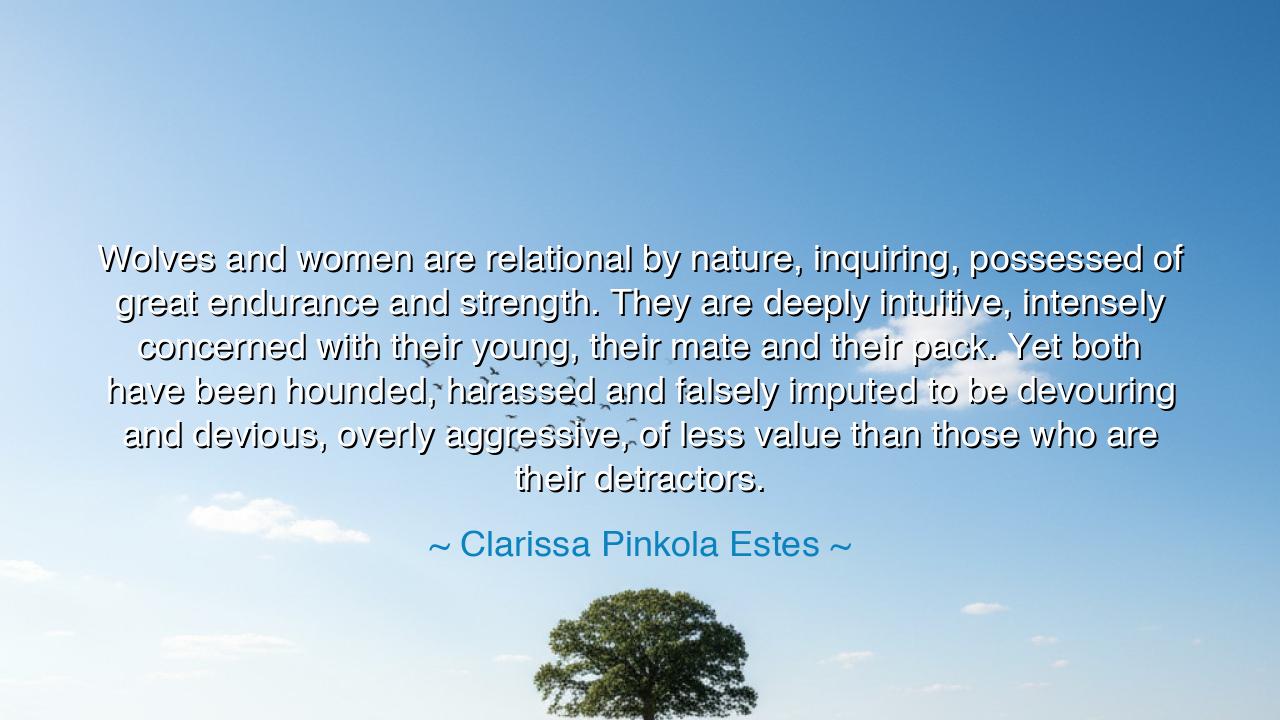
Wolves and women are relational by nature, inquiring, possessed
Wolves and women are relational by nature, inquiring, possessed of great endurance and strength. They are deeply intuitive, intensely concerned with their young, their mate and their pack. Yet both have been hounded, harassed and falsely imputed to be devouring and devious, overly aggressive, of less value than those who are their detractors.






“Wolves and women are relational by nature, inquiring, possessed of great endurance and strength. They are deeply intuitive, intensely concerned with their young, their mate and their pack. Yet both have been hounded, harassed and falsely imputed to be devouring and devious, overly aggressive, of less value than those who are their detractors.” Thus spoke Clarissa Pinkola Estés, the wise storyteller, poet, and psychoanalyst whose words in Women Who Run With the Wolves awakened the ancient wild spirit sleeping in the hearts of women across the world. In this single passage, she binds together myth and truth, nature and soul, to reveal a sacred kinship — the wild feminine that lives both in woman and in wolf, a force of intuition, strength, and unbreakable connection to life itself.
The origin of this quote lies in Estés’ great work, Women Who Run With the Wolves — a book woven from myth, folklore, and psychology. Through her study of archetypes and ancient tales, she sought to restore what civilization has long sought to tame: the instinctive, creative, and powerful essence of womanhood. The wild woman archetype, as she names it, is not savage in cruelty, but wild in freedom — an untamed soul that lives close to nature, truth, and the deep knowing of the heart. Like the wolf, this feminine force is social, loyal, nurturing, and wise — yet it has been misunderstood, vilified, and hunted by cultures that fear what they cannot control.
In comparing wolves and women, Estés offers not merely a poetic metaphor, but a spiritual reflection on survival. Both, she says, are relational by nature — they thrive in connection, not isolation. The wolf does not wander aimlessly; she lives in a pack, governed by loyalty and care. Likewise, the woman of her true nature builds webs of kinship, nurturing life in all its forms — children, love, community, art, and vision. Yet both have been hounded and harassed, labeled as dangerous when they dare to live freely. Patriarchal societies, like hunters stalking the forest, have sought to break the spirit of women by calling them “too much” — too strong, too wild, too passionate. In truth, this “too much” is the essence of their greatness.
This image of the wolf-woman has echoed throughout history and legend. Think of Joan of Arc, the young shepherdess who heard divine voices calling her to lead armies and reclaim her nation. Her strength, courage, and conviction terrified those who ruled by fear, and they branded her a heretic and witch. Yet her spirit could not be silenced, even by flame. Or consider the countless women — mothers, healers, warriors, poets — who, throughout time, have been dismissed or destroyed simply for listening to their inner knowing. Like the wolves driven from their forests, they were misunderstood, hunted for their instincts, yet their spirit endured in secret, waiting to return.
What Estés calls us to remember is that the wild feminine is sacred, not sinful. The wolf’s power does not lie in violence, but in balance — the dance between ferocity and compassion, solitude and communion. So too with women: the same intuition that nurtures life can defend it; the same tenderness that comforts can also command. To suppress this duality is to maim the soul. Civilization’s attempt to tame the wolf-woman has left both nature and humanity impoverished, for in silencing the wild, we lose wisdom — the deep knowledge of the cycles of birth, death, renewal, and belonging.
The lesson in Estés’ words is not only for women, but for all who have felt the call of their untamed spirit. She reminds us that to live truly is to reclaim the wild within — the instinct that knows when to protect, when to create, when to speak, and when to be silent. To be wild does not mean to be lawless, but to be whole — to live in harmony with one’s nature rather than in submission to the false expectations of others. Each of us must ask: Have we silenced our howl? Have we traded our instincts for approval, our strength for safety? To live fully, we must listen again to that ancient voice inside us, the voice that says: You were made to run free.
Therefore, O child of the earth, take this teaching to heart. Be like the wolf — loyal to your pack, but unafraid to stand alone. Guard your joy and your wisdom as fiercely as she guards her den. Be tender when tenderness is needed, but do not forget your power when you are called to defend what is sacred. And above all, do not believe the world when it tells you that your wildness is a flaw. It is your birthright.
For as Clarissa Pinkola Estés teaches, the wolf and the woman are reflections of the same eternal truth: to be wild is to be alive, and to be alive is to love fiercely, to endure greatly, and to walk this earth in harmony with all that is. Let the world misunderstand you if it must — but never misunderstand yourself. Run with the wolves, listen to your intuition, and live in the fullness of your untamed heart. For the howl of the free woman, like the song of the wild wolf, is the oldest and most beautiful sound in creation — the sound of life remembering itself.






AAdministratorAdministrator
Welcome, honored guests. Please leave a comment, we will respond soon